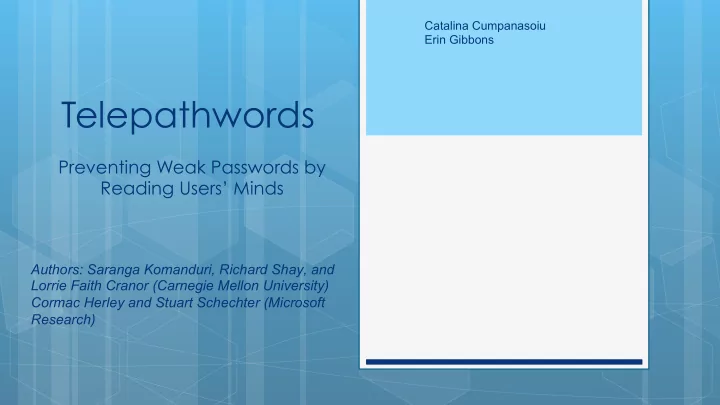

Catalina Cumpanasoiu Erin Gibbons Telepathwords Preventing Weak Passwords by Reading Users’ Minds Authors: Saranga Komanduri, Richard Shay, and Lorrie Faith Cranor (Carnegie Mellon University) Cormac Herley and Stuart Schechter (Microsoft Research)
Introduction • Passwords are not going away anytime soon • Most websites use composition rules (e.g. Windows) • Some offer meters to provide feedback on the strength of user password e.g. Egelman et al. (2013): if important account, users use meter when choosing password e.g. Ur et al. (2012): users become frustrated and lose confidence in meter
Introduction • Alternatives to composition rules: e.g. Wheeler(2004): zxcvbn, open-source meter using entropy calculations developed and used by DropBox e.g. Schechter et al. (2010): system prevents choosing popular passwords
Framework 1. What is Telepathwords? 1. Show website 2. Prediction algorithms 1. Common character sequence 2. Keyboard movements 3. Repeated strings 4. Interleaved strings 3. Testing 1. Users response 2. Security 4. Limitations 5. Conclusion
Framework 1. What is Telepathwords? 1. Show website 2. Prediction algorithms 1. Common character sequence 2. Keyboard movements 3. Repeated strings 4. Interleaved strings 3. Testing 1. Users response 2. Security 4. Limitations 5. Conclusion
What is Telepathwords? weak-password-prevention system - real-time prediction of next typed character - how it looks - https://telepathwords.research.microsoft.com/ -
Framework 1. What is Telepathwords? 1. Show website 2. Prediction algorithms 1. Common character sequence 2. Keyboard movements 3. Repeated strings 4. Interleaved strings 3. Testing 1. Users response 2. Security 4. Limitations 5. Conclusion
Prediction Algorithms - Common character sequences • each predictor uses a trie what is a trie? • like binary trees • walk from node to node • common character sequences • come from language models and databases of common passwords the most probable letter to • come next is stored in the leftmost node
Prediction Algorithms - Common character sequences table for common character substitutions (e.g. $ for s, 3 for e, 0 for o) - different windows for each prefix (note: cost of analysis increases) - detect words broken by distractor characters -
Prediction Algorithms - Keyboard Movements maps characters to x and y coordinates - counts consecutive moves that are to adjacent keys -
Prediction Algorithms - Repeated Strings if repetitions are adjacent guesses next character in repetition - e.g. xyabcabcabc if repetitions not adjacent assumes whatever is between the - repetitions is part of repetition as well e.g. abcdefabcdef (blue: user typed; red: guessed by program)
Prediction Algorithms - Interleaved Strings splits in odd and even - runs two analyses, one for odds, one for even - e.g. phaeslslwooyrodu password helloyou
Framework 1. What is Telepathwords? 1. Show website 2. Prediction algorithms 1. Common character sequence 2. Keyboard movements 3. Repeated strings 4. Interleaved strings 3. Testing 1. Users response 2. Security 4. Limitations 5. Conclusion
Testing 2 versions of Telepathwords-based policy: - telepath: at least 6 char unpredicted by system - telepath-v: same as telepath but password shown by default - compared to: - basic8: at least 8 char long - 3class8: 8 char length, include 3 of 4 char classes - 3class12: 12 char length, include 3 of 4 char classes - 3class8-d: 8 char length, 3 of 4 char classes, doesn’t match any - of the 3M words in Openwall cracking dictionary
Testing - User Response - More people annoyed by telepath than pure composition ones - Users believed Telepath feedback provided more insight than others - Both telepath among the treatments users considered more secure than previous password
Testing - Password Security • Only considered weakest passwords • Used three metrics to score passwords: zxcvbn-entropy score: randomness score • Weir+ guess number: number of guesses to crack it • Telepathwords: number of hard to guess characters •
Testing - Password Security All three metrics showed • telepath and telepath-v were substantially more secure Telepath and telepath-v had • the lowest percentages of passwords with zxcvbn- entropy scores of 20 or less
Testing - Password Security • Security principle: psychological acceptability • Tested user recall of passwords a few days later
Framework 1. What is Telepathwords? 1. Show website 2. Prediction algorithms 1. Common character sequence 2. Keyboard movements 3. Repeated strings 4. Interleaved strings 3. Testing 1. Users response 2. Security 4. Limitations 5. Conclusion
Limitations System limitations: - US-centered language corpus (somewhat dated too) - can’t detect reversed sequences characters - privacy policy prevents growth of language corpus Testing limitations: - role-play scenario might not reflect reality - user recall tested after a short period
Conclusion - Telepathwords provides users with significantly more insight into quality of their passwords - Results in passwords stronger than approaches that do not use dictionaries - To crack 1% of Telepathwords passwords, need 1000+ more guesses than default password policies passwords
Recommend
More recommend